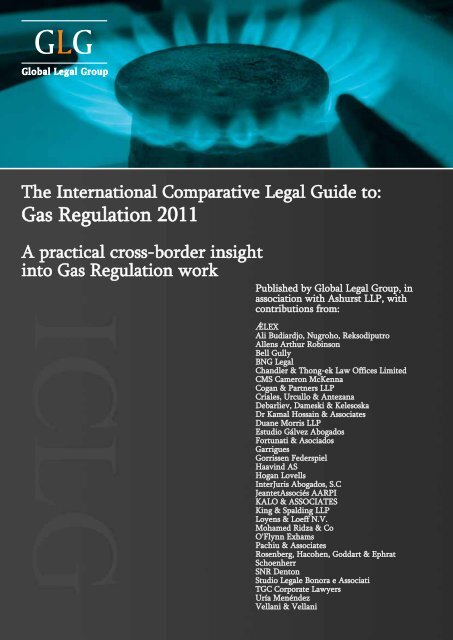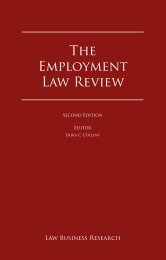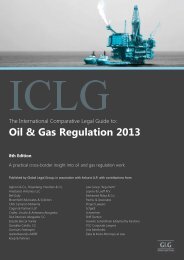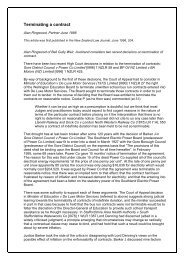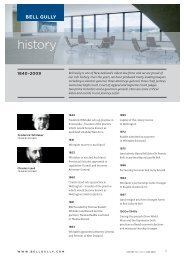Zealand
Gas Regulation 2011 - Bell Gully
Gas Regulation 2011 - Bell Gully
- No tags were found...
Create successful ePaper yourself
Turn your PDF publications into a flip-book with our unique Google optimized e-Paper software.
Bell Gully<br />
New <strong>Zealand</strong><br />
New <strong>Zealand</strong><br />
192<br />
1.3 To what extent are New <strong>Zealand</strong>’s natural gas<br />
requirements met through domestic natural gas<br />
production?<br />
Natural gas used in New <strong>Zealand</strong> is entirely indigenous. Some LPG<br />
is imported.<br />
1.4 To what extent is New <strong>Zealand</strong>’s natural gas production<br />
exported (pipeline or LNG)?<br />
New <strong>Zealand</strong> does not export natural gas.<br />
2 Development of Natural Gas<br />
2.1 Outline broadly the legal/statutory and organisational<br />
framework for the exploration and production<br />
(“development”) of natural gas reserves including:<br />
principal legislation; in whom the State’s mineral rights to<br />
natural gas are vested; Government authority or<br />
authorities responsible for the regulation of natural gas<br />
development; and current major initiatives or policies of<br />
the Government (if any) in relation to natural gas<br />
development.<br />
The exploration and development of New <strong>Zealand</strong>’s natural gas<br />
resource is governed primarily by the Petroleum Act 1937, the<br />
Crown Minerals Act 1991, the Minerals Programme for Petroleum<br />
2005 (issued under the Crown Minerals Act) and associated<br />
regulations. Downstream activities are regulated by the Gas Act<br />
1992 and various regulations and rules promulgated under that Act.<br />
The Petroleum Act and the Crown Minerals Act state the law<br />
relating to the management of Crown-owned minerals, while the<br />
Minerals Programme for Petroleum (prepared by the Minister of<br />
Energy and Resources) contains the policies and procedures<br />
governing the development of all petroleum resources (including<br />
gas). Responsibility for giving effect to both these instruments lies<br />
with Crown Minerals, an office of the Ministry of Economic<br />
Development.<br />
The Government has committed to a $25.4 million seismic<br />
acquisition programme between 2008 – 2011, and has so far<br />
acquired seismic data over the Reinga Basin, the Pegasus Basin and<br />
the Bounty Trough. This follows an earlier seismic data acquisition<br />
project between 2004 – 2008, which involved the Government<br />
purchasing seismic data over the Northland Basin, the deepwater<br />
Taranaki Basin, the Great South Basin and the East Coast and<br />
Raukumara Basins. This data was offered freely to explorers and<br />
led to the award of several exploration permits. The Government<br />
has also extended, until 2014, the current tax exemption on the<br />
profits of non-resident operators of offshore rigs and seismic<br />
vessels (which was set to expire on 31 December 2009).<br />
As part of the Petroleum Action Plan released by the Government<br />
in 2009 (see question 1.1 above), the Government is currently<br />
undertaking a review of the minerals management regime in New<br />
<strong>Zealand</strong>. Phase 1 of this review is underway, and involves a review,<br />
to be followed by a public consultation, of the Crown Minerals Act.<br />
The Crown Minerals Act sets out the broad legislative framework<br />
for the issuing of permits to prospect, explore and mine petroleum<br />
within New <strong>Zealand</strong>’s territorial area. A discussion document was<br />
released by the Government in August 2010 and an amendment Bill<br />
is expected to be introduced to Parliament in December 2010.<br />
Phase 2 of the review is expected to take place in early 2011 and the<br />
Ministry of Economic Development has stated that this will include<br />
public consultation on proposed revisions to the Minerals<br />
Programme for Petroleum and associated relevant regulations.<br />
In addition, the Government is currently undertaking a review of<br />
New <strong>Zealand</strong>’s health, safety and environmental arrangements in<br />
relation to offshore petroleum operations, to ensure they are fit for<br />
purpose and compare favourably to international best practice.<br />
The Gas Act outlines the responsibilities of gas operators and<br />
owners of gas fittings, and provides for a co-regulatory model of<br />
gas governance. Under this system, an ‘industry body’ may<br />
recommend regulations and rules to the Minister of Energy and<br />
Resources in the areas of wholesaling, processing, transmission and<br />
distribution of gas. The Gas Industry Company (GIC) is the<br />
industry body approved pursuant to the Gas Act and has, since its<br />
approval in late 2004, made several recommendations. The GIC is<br />
required to have regard to the objectives and outcomes set out in the<br />
Government Policy Statement on Gas Governance 2008 when<br />
making such recommendations.<br />
Despite promoting industry-led solutions and light-handed<br />
regulation, the Government has maintained oversight of the process<br />
and has reserved the right to regulate unilaterally where industry<br />
solutions are not considered appropriate. The Government has also<br />
indicated its intention to establish a regulatory authority of its own<br />
if the GIC does not deliver the required outcomes.<br />
The Resource Management Act 1991, the Hazardous Substances<br />
and New Organisms Act 2004 and the Maritime Transport Act 1994<br />
also play important roles in any natural gas development. Due to<br />
the time-consuming nature of the resource consent process, the<br />
Minister for the Environment may use a ‘call-in’ process (on a caseby-case<br />
basis) to streamline the appeals process and decrease<br />
consent timeframes.<br />
2.2 How are the State’s mineral rights to develop natural gas<br />
reserves transferred to investors or companies<br />
(“participants”) (e.g. licence, concession, service contract,<br />
contractual rights under Production Sharing Agreement?)<br />
and what is the legal status of those rights or interests<br />
under domestic law?<br />
All gas in its natural state is the property of the Crown. Property in<br />
the gas will pass to a permit holder who has obtained the gas<br />
lawfully and in the course of activities authorised by a permit issued<br />
by the Minister of Energy and Resources.<br />
As described below (in question 2.3), three types of permits are<br />
available under the Crown Minerals Act: prospecting, exploration<br />
and mining permits. While prospecting rights are non-exclusive<br />
and do not generally imply subsequent rights, exploration and<br />
mining rights are exclusive. Further, an exploration permit<br />
generally gives a subsequent right to apply for, and be granted<br />
(subject to satisfying certain specified criteria), a mining permit<br />
(however, this is currently under review as part of the Crown<br />
Minerals Act review noted above in question 2.1).<br />
In addition, some licences continue to exist under the Petroleum<br />
Act.<br />
2.3 If different authorisations are issued in respect of different<br />
stages of development (e.g., exploration appraisal or<br />
production arrangements), please specify those<br />
authorisations and briefly summarise the most important<br />
(standard) terms (such as term/duration, scope of rights,<br />
expenditure obligations).<br />
Three types of permits are granted by the Minister of Energy and<br />
Resources: prospecting, exploration and mining.<br />
Prospecting permits allow for the reconnaissance of prospective gas<br />
fields, typically by the collection of geological, geophysical and<br />
WWW.ICLG.CO.UK<br />
ICLG TO: GAS REGULATION 2011<br />
© Published and reproduced with kind permission by Global Legal Group Ltd, London
Bell Gully<br />
New <strong>Zealand</strong><br />
New <strong>Zealand</strong><br />
2.10 Can rights to develop natural gas reserves granted to a<br />
participant be pledged for security, or booked for<br />
accounting purposes under domestic law?<br />
A security interest may be granted over a licence or permit granted<br />
under the Petroleum Act or the Crown Minerals Act. However, the<br />
transfer restrictions in section 23 of the Petroleum Act and section<br />
41 of the Crown Minerals Act apply upon the exercise of any such<br />
security interest (as above, question 2.8).<br />
2.11 In addition to those rights/authorisations required to<br />
explore for and produce natural gas, what other principal<br />
Government authorisations are required to develop<br />
natural gas reserves (e.g. environmental, occupational<br />
health and safety) and from whom are these<br />
authorisations to be obtained?<br />
that bonds will be required in respect of such activities.<br />
In addition, the requirements of the Resource Management Act, the<br />
Health and Safety in Employment Act, the Maritime Transport Act,<br />
and the Hazardous Substances and New Organisms Act will have to<br />
be observed in respect of any decommissioning activities.<br />
2.13 Is there any legislation or framework relating to gas<br />
storage? If so, what are the principle<br />
features/requirements of the legislation?<br />
There is no specific legislation or framework relating to<br />
underground gas storage, however, it can be carried out under the<br />
Crown Minerals Act. As noted in question 1.1 above, the first<br />
underground gas storage facility has recently been developed at the<br />
Ahuroa reservoir in Taranaki under an existing mining licence.<br />
Development of the natural gas resource may require resource<br />
consents, building consents, permits and compliance plans under<br />
the following Acts: the Resource Management Act, the Building<br />
Act 2004, the Maritime Transport Act, the Hazardous Substances<br />
and New Organisms Act and the Overseas Investment Act 2005.<br />
Further, the Health and Safety in Employment Act 1992 (and<br />
relevant regulations under that Act) requires compliance with<br />
certain workplace safety standards.<br />
In addition, the Government has indicated that new legislation<br />
relating to New <strong>Zealand</strong>’s Exclusive Economic Zone (the area<br />
outside New <strong>Zealand</strong>’s 12 nautical mile limit) is expected to come<br />
into force in 2011 and is intended to increase the protection of New<br />
<strong>Zealand</strong>’s Exclusive Economic Zone by regulating certain<br />
activities. A consenting regime is intended to be established which<br />
will classify activities as either permitted, discretionary or<br />
prohibited. Certain activities, such as seismic data acquisition, are<br />
likely to be permitted activities, while higher impact activities, such<br />
as drilling, are likely to be discretionary activities which will<br />
require a permit. This will be coupled with a new Environmental<br />
Protection Agency, which will have primary responsibility for<br />
regulating petroleum and other activities in the Exclusive Economic<br />
Zone.<br />
There are also other workstreams currently being undertaken<br />
relating to health, safety and the environment by various<br />
Governmental bodies, including the release of draft Import Health<br />
Standards concerning the cleanliness of vessels coming into New<br />
<strong>Zealand</strong>, a review of the decommissioning of offshore facilities and<br />
the release of specific marine mammal regulations by the<br />
Department of Conservation, which are likely to impact near-shore<br />
seismic activities.<br />
2.12 Is there any legislation or framework relating to the<br />
abandonment or decommissioning of physical structures<br />
used in natural gas development? If so, what are the<br />
principal features/requirements of the legislation?<br />
Decommissioning and abandonment procedures typically constitute<br />
part of the work programme included as part of a permit granted<br />
under the Crown Minerals Act 1991. While the decommissioning<br />
of facilities has not been of particular significance in New <strong>Zealand</strong><br />
to date, the Ministry of Economic Development has indicated that<br />
there will be significantly more emphasis on the decommissioning<br />
of facilities going forward and, as stated above, it is currently<br />
undertaking a review of the decommissioning of offshore facilities.<br />
It has also announced that greater requirements in relation to<br />
decommissioning will be specified in the relevant minerals<br />
programmes, regulations and permit conditions, and it is also likely<br />
3 Import / Export of Natural Gas (including LNG)<br />
3.1 Outline any regulatory requirements, or specific terms,<br />
limitations or rules applying in respect of cross-border<br />
sales or deliveries of natural gas (including LNG).<br />
Due to the entirely indigenous supply of natural gas in New<br />
<strong>Zealand</strong>, and the absence of exports, no specific regime exists. If<br />
New <strong>Zealand</strong> were to import LNG, for example, companies<br />
importing LNG would need to comply with the environmental and<br />
safety provisions of the Maritime Transport Act and the Hazardous<br />
Substances and New Organisms Act.<br />
4 Transportation<br />
4.1 Outline broadly the ownership, organisational and<br />
regulatory framework in relation to transportation<br />
pipelines and associated infrastructure (such as natural<br />
gas processing and storage facilities).<br />
New <strong>Zealand</strong>’s high-pressure gas network is owned by two entities:<br />
Vector, which runs high-pressure pipes to primary load centres; and<br />
MDL, which operates the Maui high-pressure pipeline. The Vector<br />
network is also a welded party to the Maui pipeline.<br />
The Maui Pipeline Operating Code (MPOC) provides the regime<br />
that governs parties shipping gas through the Maui pipeline. The<br />
Vector Transmission Code (VTC) provides for non-discriminatory<br />
access to the Vector network for users, as well as minimum<br />
standards of conduct and disclosure on behalf of the pipeline owner.<br />
There are also specific regulatory requirements for gas pipelines<br />
and gas-processing facilities under the Commerce Act 1986 and the<br />
Gas Act.<br />
4.2 What Governmental authorisations (including any<br />
applicable environmental authorisations) are required to<br />
construct and operate natural gas transportation pipelines<br />
and associated infrastructure?<br />
Resource and building consents are required under the Resource<br />
Management Act and the Building Act respectively. Consent and<br />
approval may be required under the Hazardous Substances and New<br />
Organisms Act to transport a potentially dangerous substance such<br />
as natural gas. There are also requirements relating to land access<br />
in the Crown Minerals Act.<br />
194<br />
WWW.ICLG.CO.UK<br />
ICLG TO: GAS REGULATION 2011<br />
© Published and reproduced with kind permission by Global Legal Group Ltd, London
Bell Gully<br />
New <strong>Zealand</strong><br />
from a Cease and Desist Commissioner, seek an injunction from the<br />
High Court under section 81 of the Commerce Act or take a private<br />
civil prosecution to seek a pecuniary penalty and damages for<br />
breach.<br />
If the Court finds that a person has breached the Commerce Act, it<br />
may impose pecuniary penalties on businesses that must not exceed<br />
the greater of:<br />
$10 million; or<br />
either:<br />
three times the value of any commercial gain or<br />
expected commercial gain resulting from the breach;<br />
or<br />
if commercial gain is not known, 10% of the turnover<br />
of the business and all of its interconnected businesses<br />
(if any).<br />
The Commerce Act also creates personal liability for anticompetitive<br />
conduct. While pecuniary penalties may not exceed<br />
$500,000 for an individual, the Court may also order that the<br />
individual concerned be excluded from the management of a body<br />
corporate for up to five years. Moreover, companies may not<br />
indemnify individuals involved in price-fixing.<br />
8.4 Does the regulator (or any other Government authority)<br />
have the power to approve/disapprove mergers or other<br />
changes in control over businesses in the natural gas<br />
sector, or proposed acquisitions of development assets,<br />
transportation or associated infrastructure or distribution<br />
assets? If so, what criteria and procedures are applied?<br />
How long does it typically take to obtain a decision<br />
approving or disapproving the transaction?<br />
The Commerce Act prohibits mergers and acquisitions that have the<br />
effect or likely effect of substantially lessening competition in a<br />
market. This Act provides a voluntary pre-acquisition notification<br />
regime whereby companies may apply for either clearance or<br />
authorisation of proposed mergers or acquisitions. The Commerce<br />
Commission must grant clearances where it is satisfied that a<br />
transaction is unlikely to substantially lessen competition, and<br />
authorisations for transactions that, although lessening competition,<br />
would provide public benefits outweighing the detriment caused.<br />
While the Commerce Commission might apply to a Cease and<br />
Desist Commissioner for an order to stop a transaction, ultimate<br />
authority lies with the courts and their jurisdiction to hear judicial<br />
review and appeals of Commerce Commission decisions, as well as<br />
claims by third parties.<br />
As noted in questions 5.6 and 9.1, Overseas Investment Office<br />
(OIO) clearance (pursuant to the Overseas Investment Act) may<br />
also be required and may take approximately three to four months<br />
to obtain. A similar timeframe can be expected for gaining approval<br />
for the transfer of permits under the Crown Minerals Act (as noted<br />
in question 2.8, above).<br />
9 Foreign Investment and International<br />
Obligations<br />
9.1 Are there any special requirements or limitations on<br />
acquisitions of interests in the natural gas sector (whether<br />
development, transportation or associated infrastructure,<br />
distribution or other) by foreign companies?<br />
or indirectly, “sensitive land”.<br />
Consent of the OIO will be required when the overseas person<br />
(together with its associates) wishes to invest more than NZ$100<br />
million in an asset or business or where the overseas person<br />
(together with its associates) acquires a 25% or more interest in a<br />
company where:<br />
the consideration provided exceeds $100 million;<br />
the assets of the company and certain subsidiaries exceed<br />
$100 million; or<br />
the company holds or controls sensitive land.<br />
While investors may not purchase areas on the seabed, it is possible<br />
that an onshore area might, in certain cases, constitute sensitive land<br />
(by virtue of size and rural location, or proximity to features such as<br />
conservation areas, waterways or parks). Applications relating to<br />
land assets are assessed by the Minister of Finance and the Minister<br />
of Land Information. The potential investor must demonstrate<br />
business experience and acumen relevant to the investment,<br />
financial commitment to the investment and their good character.<br />
In addition, in the case of sensitive land, the OIO must be satisfied<br />
the overseas person is ordinarily a resident in New <strong>Zealand</strong> or is<br />
intending to reside in New <strong>Zealand</strong>, or, the overseas investment<br />
will, or is likely to, benefit New <strong>Zealand</strong>.<br />
9.2 To what extent is regulatory policy in respect of the<br />
natural gas sector influenced or affected by international<br />
treaties or other multinational arrangements?<br />
The Government’s energy policy is influenced by the Kyoto<br />
Protocol and New <strong>Zealand</strong>’s obligations under that Protocol have<br />
been implemented through the Climate Change Response Act 2002<br />
and various amendments to that Act.<br />
Despite this commitment to the Kyoto Protocol, the Government<br />
has repealed the Electricity (Renewable Preference) Amendment<br />
Act 2008, which, among other things, imposed a ten-year<br />
moratorium on new thermal generation of electricity. Nonetheless,<br />
the Government has indicated that it intends to retain a target to<br />
reach 90% of electricity from renewable sources by 2025, provided<br />
this goal does not impact security of supply.<br />
The Government is also currently reviewing the New <strong>Zealand</strong><br />
Energy Strategy and the New <strong>Zealand</strong> Energy Efficiency and<br />
Conservation Strategy. A revised draft of both documents was<br />
released by the Government in July 2010 for public consultation.<br />
The draft New <strong>Zealand</strong> Energy Strategy sets out the Government’s<br />
direction for energy and the role that energy will play in the New<br />
<strong>Zealand</strong> economy. It identifies four priorities to achieve the goal of<br />
maximising the energy sector’s contribution to New <strong>Zealand</strong>’s<br />
economic growth. The draft New <strong>Zealand</strong> Energy Efficiency and<br />
Conservation Strategy aims to make improvements in energy<br />
efficiency, energy conservation and renewable energy and has the<br />
aim of delivering a 55 PJ saving across the New <strong>Zealand</strong> economy<br />
by 2015.<br />
New <strong>Zealand</strong> has ratified the United Nations Convention on the<br />
Law of the Sea. Although this treaty mentions the development of<br />
gas reserves, it does not directly affect regulatory policy in respect<br />
of natural gas.<br />
New <strong>Zealand</strong><br />
In broad terms, potential overseas investors must obtain the consent<br />
of the OIO in two situations: when making a significant investment<br />
in a New <strong>Zealand</strong> business or asset, and when purchasing, directly<br />
ICLG TO: GAS REGULATION 2011<br />
© Published and reproduced with kind permission by Global Legal Group Ltd, London<br />
WWW.ICLG.CO.UK<br />
197
Bell Gully<br />
New <strong>Zealand</strong><br />
10 Dispute Resolution<br />
11 Updates<br />
New <strong>Zealand</strong><br />
10.1 Provide a brief overview of compulsory dispute resolution<br />
procedures (statutory or otherwise) applying to the natural<br />
gas sector (if any), including procedures applying in the<br />
context of disputes between the applicable Government<br />
authority/regulator and: participants in relation to natural<br />
gas development; transportation pipeline and associated<br />
infrastructure owners or users in relation to the<br />
transportation, processing or storage of natural gas; and<br />
distribution network owners or users in relation to the<br />
distribution/transmission of natural gas.<br />
No compulsory dispute resolution procedures are mandated<br />
between supply-side participants such as regulators, producers and<br />
retailers.<br />
However, the Electricity and Gas Complaints Commission provides<br />
a binding disputes resolution service for consumers who have had<br />
disputes with their retail provider. Companies signed up to the<br />
Complaints Commission include Contact Energy, Vector, Genesis<br />
Energy and Meridian Energy.<br />
10.2 Is New <strong>Zealand</strong> a signatory to, and has it duly ratified into<br />
domestic legislation: the New York Convention on the<br />
Recognition and Enforcement of Foreign Arbitral Awards;<br />
and/or the Convention on the Settlement of Investment<br />
Disputes between States and Nationals of Other States<br />
(“ICSID”)?<br />
The Arbitration Act 1996 ratifies the New York Convention in New<br />
<strong>Zealand</strong>; the Arbitration (International Investment Disputes) Act<br />
1979 provides that articles 18, 20 to 24, and chapters II to VII of the<br />
ICSID have the force of law in New <strong>Zealand</strong>.<br />
In addition, the GIC has certain dispute resolution functions under<br />
the VTC and the MPOC in respect of the pipelines covered by those<br />
codes.<br />
10.3 Is there any special difficulty (whether as a matter of law<br />
or practice) in litigating, or seeking to enforce judgments<br />
or awards, against Government authorities or State<br />
organs (including any immunity)?<br />
11.1 Please provide, in no more than 300 words, a summary of<br />
any new cases, trends and developments in Gas<br />
Regulation Law in New <strong>Zealand</strong>.<br />
A significant judgment of the High Court of New <strong>Zealand</strong> was<br />
given in 2010 in relation to a case between major upstream oil and<br />
gas participants in New <strong>Zealand</strong>. Proceedings were brought by<br />
Todd Pohokura Limited (Todd) against its joint venture partners in<br />
the Pohokura oil and gas field in Taranaki, Shell Exploration NZ<br />
Limited (Shell) and OMV New <strong>Zealand</strong> Limited (OMV). In 2006,<br />
Todd commenced proceedings alleging, in essence, that Shell and<br />
OMV were unlawfully constraining the level of production from the<br />
Pohokura field. Todd made several claims, including that the<br />
arrangements between Shell and OMV regarding the level of<br />
Pohokura’s production breached both Todd’s contractual<br />
entitlements under the JVOA and sections 27, 29 and 30 of the<br />
Commerce Act 1986 (relating to anti-competitive behaviour). In a<br />
judgment delivered in July 2010, the High Court of New <strong>Zealand</strong><br />
largely rejected Todd’s claims. Todd has appealed this decision and<br />
the appeal is expected to be heard in August 2011.<br />
As previously indicated, the New <strong>Zealand</strong> Government is seeking<br />
to increase economic growth by attempting to maximise the gains<br />
from New <strong>Zealand</strong>’s oil and gas resources and has been visibly<br />
proactive in supporting investment in, and increased development<br />
of, the upstream oil and gas industry to achieve this. The release of<br />
the Petroleum Action Plan in November 2009 and the subsequent<br />
workstreams undertaken in 2010 arising from this (for example, the<br />
review of the Crown Minerals Act), along with the significant<br />
indications of support of the industry at the 2010 New <strong>Zealand</strong><br />
Petroleum Conference, have been very encouraging to existing and<br />
potential industry participants.<br />
In conclusion, the New <strong>Zealand</strong> natural gas market is undergoing an<br />
exciting transition period, where the legislative and regulatory<br />
environment is evolving and being further developed to adapt to<br />
this dynamic and growing industry. While it is difficult at this stage<br />
to identify exactly what changes will occur, it is safe to assume that<br />
there are many to come which will help to ensure New <strong>Zealand</strong> is a<br />
highly attractive global destination for oil and gas exploration and<br />
production investment.<br />
No difficulty in taking legal action has been experienced.<br />
10.4 Have there been instances in the natural gas sector when<br />
foreign corporations have successfully obtained<br />
judgments or awards against Government authorities or<br />
State organs pursuant to litigation before domestic<br />
courts?<br />
Yes. Foreign corporations have used the normal litigation process<br />
to seek to enforce certain rights in relation to petroleum permits<br />
against the Crown.<br />
198<br />
WWW.ICLG.CO.UK<br />
ICLG TO: GAS REGULATION 2011<br />
© Published and reproduced with kind permission by Global Legal Group Ltd, London
Bell Gully<br />
New <strong>Zealand</strong><br />
David Coull<br />
Angela Bamford<br />
Bell Gully<br />
HP Tower, 171 Featherston Street<br />
Wellington<br />
New <strong>Zealand</strong><br />
Tel: +64 4 915 6863<br />
Fax: +64 4 915 6810<br />
Email: david.coull@bellgully.com<br />
URL: www.bellgully.com<br />
David specialises in corporate and energy law. He advises on<br />
M&A and other corporate transactions, the negotiation of<br />
commercial contracts and joint ventures, and regulatory matters.<br />
David has a particular focus on the energy industry and regularly<br />
acts as a specialist adviser to participants in the industry. He is a<br />
member of the Executive Committee of PEPANZ.<br />
His international experience includes a three-year period at<br />
Cravath, Swaine and Moore LLP, the leading U.S. corporate law<br />
firm, where he acted for corporate such as Nestle S.A.,<br />
ConocoPhillips, Bristol Myers Squibb and Citigroup. He also<br />
holds an LLM from Cambridge University.<br />
David is named as one of four leading New <strong>Zealand</strong> energy and<br />
resource lawyers in the Australasian Legal Business Guide:<br />
Energy and Resources Law 2009, which commented that he “was<br />
knowledgeable and found robust commercial solutions”.<br />
Bell Gully<br />
HP Tower, 171 Featherston Street<br />
Wellington<br />
New <strong>Zealand</strong><br />
Tel: +64 4 915 6794<br />
Fax: +64 4 915 6810<br />
Email: angela.bamford@bellgully.com<br />
URL: www.bellgully.com<br />
Angela works in Bell Gully’s corporate department with a<br />
particular focus on the oil and gas and electricity sectors.<br />
She has experience in advising clients regarding general<br />
corporate and commercial matters, including drafting and<br />
negotiating commercial contracts. In particular, Angela regularly<br />
advises on upstream and downstream oil and gas activities,<br />
including in relation to joint ventures, farm-ins, JVOAs, gas<br />
transmission and gas sales agreements. She also has<br />
experience in dealing with Crown Minerals on behalf of clients in<br />
relation to permit issues. In addition, Angela advises clients on<br />
the New <strong>Zealand</strong> electricity regulatory regime, including specific<br />
issues associated with the Electricity Industry Participation Code.<br />
Angela is also Treasurer of the Law and Economics Association<br />
of New <strong>Zealand</strong>.<br />
New <strong>Zealand</strong><br />
Bell Gully is New <strong>Zealand</strong>’s leading commercial law firm, offering innovative legal solutions to domestic and international clients,<br />
delivered by 47 partners and over 150 legal staff. Internationally, we work with prestigious multinational clients and maintain strong<br />
links with leading law firms in Australia, Asia, Europe and the US.<br />
We assist business and government to achieve successful outcomes in challenging market conditions. Our lawyers consistently<br />
deliver practical solutions to everyday and unique problems with a constant focus on achieving the best result possible.<br />
Our 10-partner energy practice has been actively involved in advising clients in every aspect of the industry for over two decades.<br />
During this time we have worked on many of the most significant transactions and projects within the oil and gas industry and<br />
broader energy sector in New <strong>Zealand</strong>.<br />
The team has leading upstream expertise in: permitting activities; M&A transactions; drafting and negotiation of JVOAs and farmout<br />
agreements; operatorship issues; operator contracts and arrangements; regulatory matters; transmission and interconnection<br />
contracts; land acquisition and land access arrangements; petroleum sales and marketing arrangements; and litigation and<br />
dispute resolution.<br />
ICLG TO: GAS REGULATION 2011<br />
© Published and reproduced with kind permission by Global Legal Group Ltd, London<br />
WWW.ICLG.CO.UK<br />
199
The International Comparative Legal Guide to:<br />
Gas Regulation 2011<br />
Other titles in the ICLG series include:<br />
Business Crime<br />
Cartels & Leniency<br />
Class Actions<br />
Commodities and Trade Law<br />
Competition Litigation<br />
Corporate Governance<br />
Corporate Recovery & Insolvency<br />
Corporate Tax<br />
Dominance<br />
Employment & Labour Law<br />
Enforcement of Competition Law<br />
Environment Law & Climate Change<br />
International Arbitration<br />
Litigation & Dispute Resolution<br />
Merger Control<br />
Mergers & Acquisitions<br />
Patents<br />
PFI / PPP Projects<br />
Pharmaceutical Advertising<br />
Product Liability<br />
Public Procurement<br />
Real Estate<br />
Securitisation<br />
Telecommunication Laws and Regulations<br />
To order a copy of a publication, please contact:<br />
Global Legal Group<br />
59 Tanner Street<br />
London SE1 3PL<br />
United Kingdom<br />
Tel: +44 20 7367 0720<br />
Fax: +44 20 7407 5255<br />
Email: sales@glgroup.co.uk<br />
www.ICLG.co.uk


